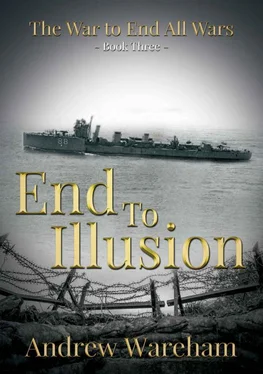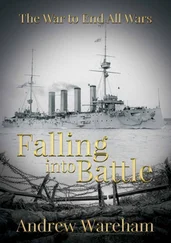Colonel Braithwaite passed them across to Richard, smiling gently.
“Gentlemen, thank you for volunteering to come to our assistance. You will know that we lost three quarters of our subalterns and captains at Neuve Chapelle and have had to make do with green replacements. They don’t know their way around the Company Books and have little idea of basic daily life. The Battalion Sergeant-Major is too busy to hold their hands and so I asked for two older men who had seen it all and done it as well to bring them up to scratch.”
The two stood tall and proud, their skills finally valued. Each had done his thirty years and had retired as a captain, having been promoted to the limit of his ability. Both had seen skirmishes in India and had fought the Boers. They were ideal to show young men the way to survive in the Army and how to do their basic job of leading small detachments of men.
“Right and Left Companies between you, gentlemen. Keep an eye out for the few who won’t make the grade. We shall return to the front in August, according to current plans. Any officer who won’t be good enough will be out on his ear before then.”
“I say, sir. What will the poor chaps do, eh? We was always used to help them along or push them across to the staff or transfer them to the Ordnance or such, you know.”
“Good if you can do it, Captain Plowright. We haven’t got the time, or the energy to spare to carry the no-hopers. Add to that, an officer who can’t pull his weight is dangerous out in the trenches. Likely to kill his own men through neglect or stupidity. Can’t be having that.”
Plowright accepted that an inadequate officer was a danger to his own men on active service.
“Saw it in Deolali in ’92, sir. Bad posting, heat used to drive men mad, sir – going doolally, we used to call it. Youngster fresh out from England and couldn’t be bothered to inspect the men’s water bottles. Half his platoon down with heatstroke! Lost two dead and four others never recovered, had to be sent Home unfit for service. All for letting them carry bottles filled half arrack, half water. Broke him, of course. Sent him back to England a civilian after three months out in India. Did none of us any favours. Son of a lord, you know. Made all sorts of fuss that the boy was put before a court. Damned fools! Any names to watch, sir?”
“Wincanton, Second Lieutenant. He is on his third week of Officer of the Day. Still another ten days left. Been in six weeks.”
They laughed – the young man had been slapped down early in his career.
“Tried to get him to put in for a transfer to this new RFC. No luck – boy says he has no head for heights. Don’t think he has a head for much, personally.”
They promised to keep an eye on the youth.
“One thing to say for Sandhurst, sir. It ain’t much good, but it drives the hopeless to send their papers in, unless they are royalty or the son of a duke or such, of course.”
Richard accepted there was no way of getting rid of those with too much influence.
“No royalty in our ranks, gentlemen! We are a fighting battalion, in the habit of getting up the sharp end.”
They nodded profoundly.
Plowright added a comment.
“Zulu War! Damned bad business, that!”
Richard was puzzled – he could not quite see the relevance. The Zulu War brought the shocking defeat at Isandlwana and the heroic defence of Rourke’s Drift to mind.
“The Empress Eugenie’s son, sir. Killed by the natives when he was out where he should not have been, exposed to danger. Speared! Damned sharp, those assegais! Why the boy was allowed out almost unaccompanied is beyond me – could never understand it!”
Richard had a vague memory of reading of the event, had not been aware it had taken place in the Zulu War.
“Exactly – even foreign royalty should be looked after better than that. We have none with us, as far as we know. Mind you, from all we hear of Dirty Bertie, nothing is impossible!”
They sniggered together, agreeing it was so.
“What of the aristocracy in general, sir? Don’t want to tread on the wrong toes, you know.”
“Very short of sons of peers in our ranks, Plowright. Wincanton, I know, and apart from that I think Colonel Braithwaite is our closest to blue-blooded.”
“Ah, yes! That family of Braithwaites, is he? Very well connected!”
The important matters established, the two captains were let loose on the battalion and entered into a reign of terror. The junior officers soon learned to cringe at the sight of the aged gentlemen bearing down on them.
“Cap badge not squared off, young man! Collar not properly starched! Speak to your batman about your shoes! Improve your posture – no place in the Bedfordshires for round shoulders! Straight back, now! March correctly – if you are on business, should be quick time! If you ain’t on business, why are you in sight?”
Second Lieutenant Wincanton found his life almost unbearable; he could not venture out of his room in the mess without a bellow of displeasure. A week and he sought an interview with Richard.
“Can I request a transfer out, sir?”
“In wartime? A transfer? You refused to apply to the RFC, although I would have supported that request. Where do you think you can go? The Navy won’t take you. I can hardly recommend you to another infantry battalion. I cannot imagine that any cavalry regiment would open its doors to you. You have no qualifications for the Medical Corps and the Pay Corps is for the unfit, those who must wear spectacles or are overage. Let us be clear, Mr Wincanton – you are no damned use to me and I cannot in any honesty send you off to any other battalion. Speak to your parents. They might have strings to pull that I do not. I can do nothing for you.”
“I do not wish to tell my father that I cannot cope in the battalion, sir. I hoped you might assist me.”
“Not a chance, young man! I can merely give you a single piece of advice – grow a pair of balls!”
The vulgarity shocked Wincanton, as was Richard’s intent. If nothing else would work then he would try crude contempt in the hope that the boy might be humiliated into growing up.
“This is your last stint as officer of the day, Mr Wincanton. I had hoped that the punishment might have encouraged you to apply yourself to your trade, to learn how to behave as an officer should. I do not seem to have been successful in my intent. I will warn you now that we are off on active service by the end of the summer. If you are not fit to command your platoon, then you will not go with us. That will demand a court martial to find you unfit and to break you down to private soldier. I do not wish to go to that extreme – it might reflect poorly on the battalion – but I shall not permit you to betray the men by your inadequacy. Go away, learn your duty and perform it. If you fail, I shall see you broken. I am sure your father will not be pleased to hear that his son has been discarded as useless!”
Wincanton left, close to tears. It occurred to Richard that he might be sensible to discover just who Wincanton’s father was; he might have power sufficient to be a nuisance.
Colonel Braithwaite did not know the family other than by the title. He promised to find out.
“Heard the name on occasion but not active in Society. Think he might be into politics. Second baron, the father. His old man was probably one of the new rich, bought a title in the Nineties. Easily done then. And now, of course.”
“In that case he might be doing much the same as my father attempted when he wangled me into Dartmouth. Trying to cement the son’s place in the upper classes by the backdoor, giving him a war record not just posing in the Guards.”
“Possible, Baker. More than likely, in fact. Won’t be forgiving of the boy if he lets him down. Take a look at his papers, see what his background is. His school might tell us something.”
Читать дальше












